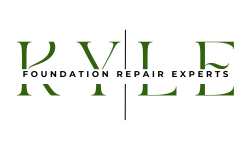Understanding Foundation Issues in Kyle, TX
Foundation issues in Kyle, TX, are a significant concern for homeowners due to the region’s unique environmental and soil conditions. The primary causes of these foundation problems can often be traced back to the area’s expansive clay soil, which is prevalent throughout Central Texas. Expansive clay soil is highly susceptible to changes in moisture content; it swells when wet and contracts when dry. These constant fluctuations can lead to significant stress on a building’s foundation, causing it to shift or crack.
Weather patterns in Kyle, TX, further exacerbate foundation issues. The region experiences hot, dry summers and occasional heavy rains, which lead to rapid and extreme changes in soil moisture levels. This cyclical wetting and drying process can weaken the soil’s structural integrity, making it less capable of supporting a stable foundation. Additionally, improper drainage around a home’s foundation can cause water to pool, seeping into the soil and leading to further instability.
Construction practices also play a role in foundation problems. In some cases, homes may be built on improperly compacted soil or without adequate consideration of the local soil conditions. This oversight can result in uneven settling over time, leading to various structural issues.
Homeowners in Kyle should be vigilant for signs and symptoms of foundation problems. Common indicators include visible cracks in walls or floors, doors and windows that do not open or close properly, and uneven or sloping floors. These signs suggest that the foundation may be shifting or deteriorating, which can compromise the structural integrity of the entire home.
Ignoring these issues can have long-term consequences. Unaddressed foundation problems can lead to severe structural damage, increased repair costs, and a decrease in property value. Early detection and timely foundation repair are crucial to preserving the safety and longevity of your home. Regular inspections and maintenance can help identify potential problems before they escalate, ensuring that your foundation remains strong and stable.
Effective Foundation Repair Solutions in Kyle, TX
Foundation repair in Kyle, TX, requires tailored solutions to address the unique soil conditions and climate of the region. Among the various methods available, slabjacking, piering, and underpinning are the most common and effective techniques.
Slabjacking involves injecting a grout mixture beneath the sunken slab to lift it back to its original position. This method is particularly useful for minor to moderate foundation settling and is cost-effective, with prices typically ranging between $500 and $1,500. The process is relatively quick, often completed within a day, and minimally invasive, causing little disruption to the property.
Piering, also known as piling, entails driving steel or concrete piers deep into the ground to stabilize and lift the foundation. It is suitable for severe foundation issues and offers long-term stability. The cost of piering can vary widely, from $1,000 to $3,000 per pier, depending on the depth and type of material used. Although more expensive and time-consuming than slabjacking, piering provides a robust solution for significant foundation problems.
Underpinning involves extending the foundation to reach more stable soil or bedrock. This method is ideal for properties experiencing substantial structural issues due to unstable soil conditions. The cost of underpinning ranges from $1,000 to $3,000 per section, and the project duration can extend over several weeks. While costly, underpinning ensures a durable and long-lasting repair.
When selecting a foundation repair contractor in Kyle, TX, it is crucial to consider factors such as experience, licensing, and customer reviews. A reputable contractor should possess extensive experience in handling local soil conditions, hold appropriate licenses, and have positive feedback from previous clients.
Preventing future foundation issues involves regular maintenance, such as ensuring proper drainage around the property, maintaining consistent moisture levels in the soil, and addressing minor cracks promptly. These measures help to preserve the integrity of the foundation and avoid costly repairs in the future.
